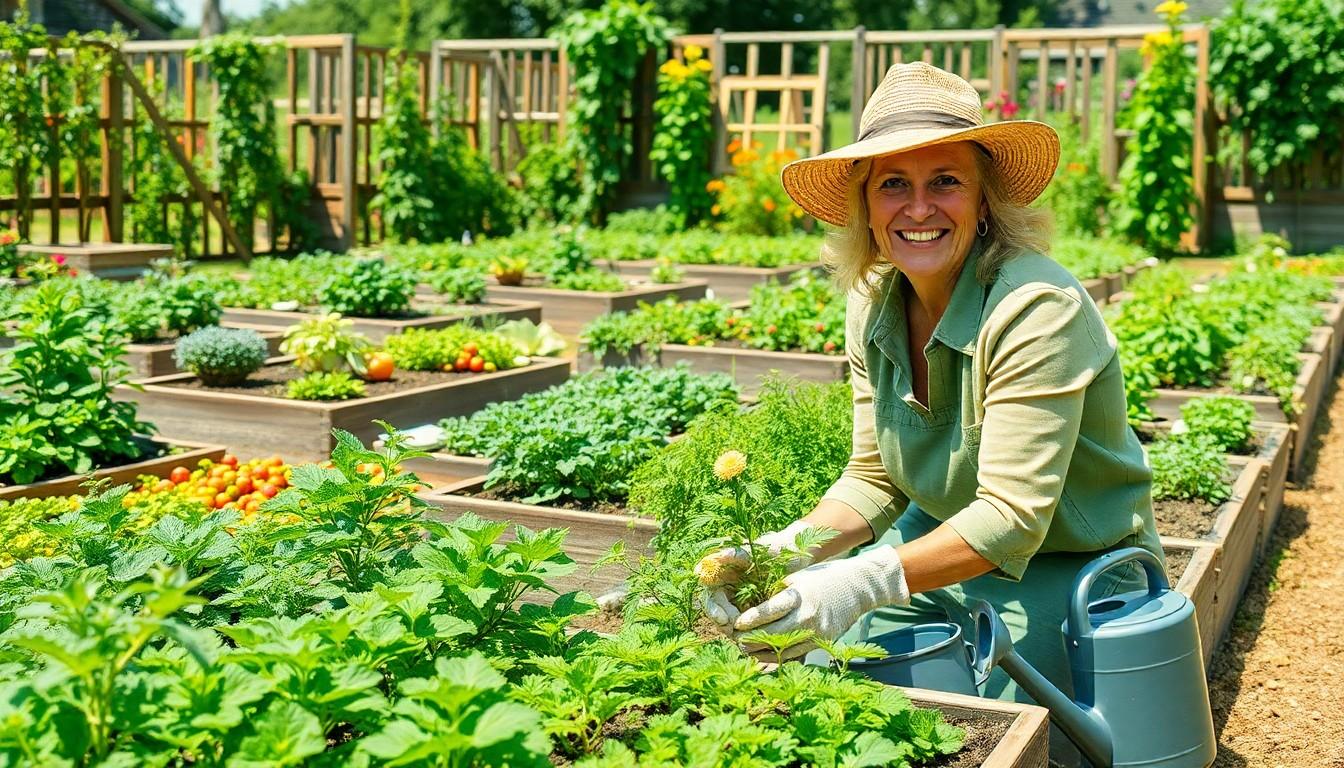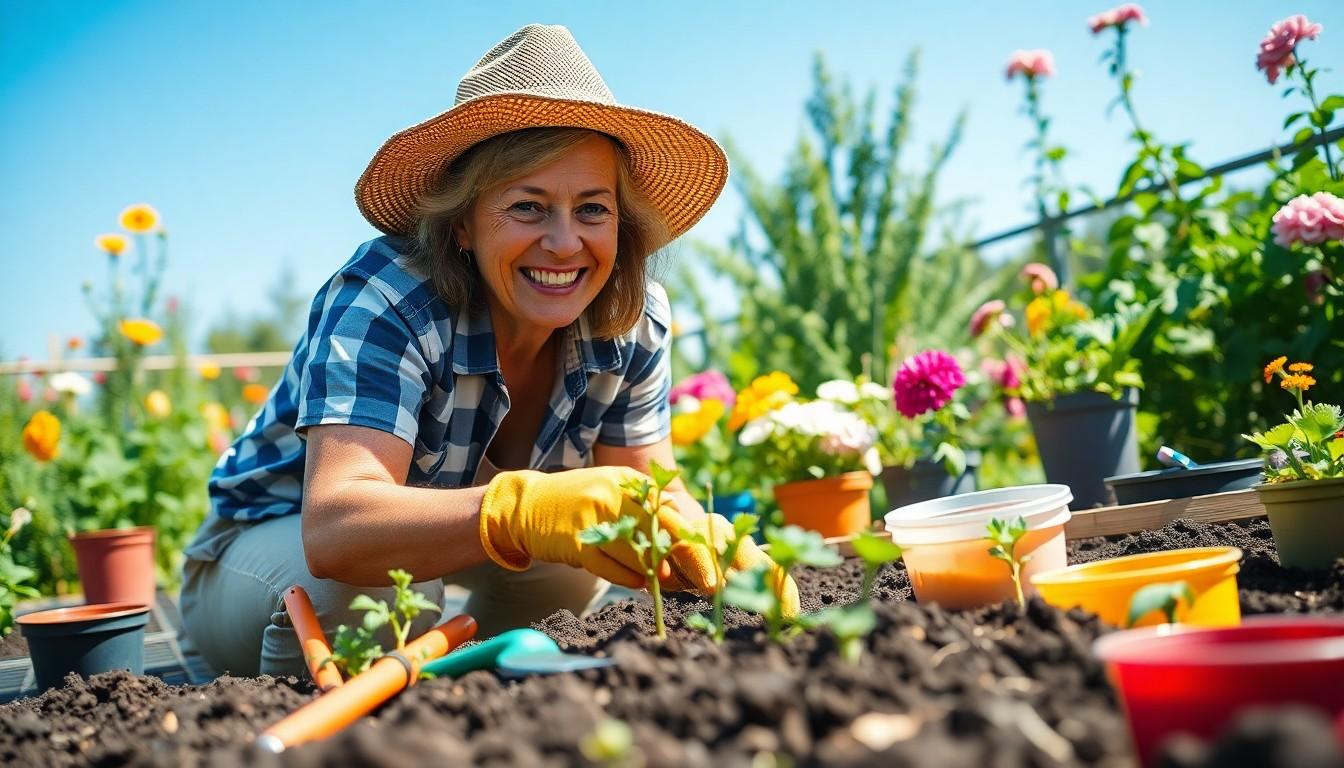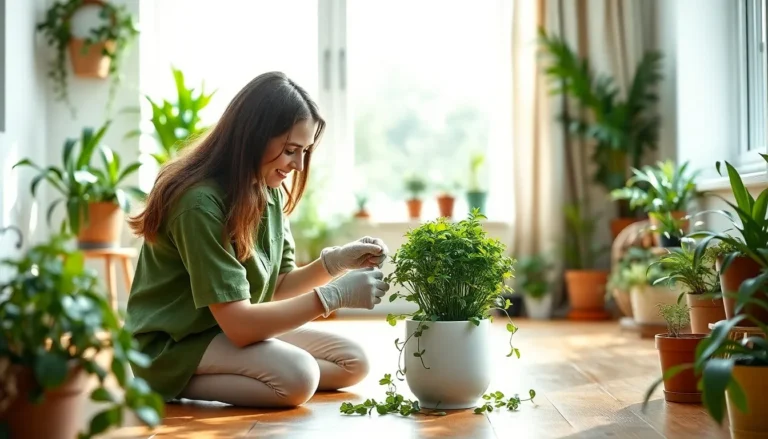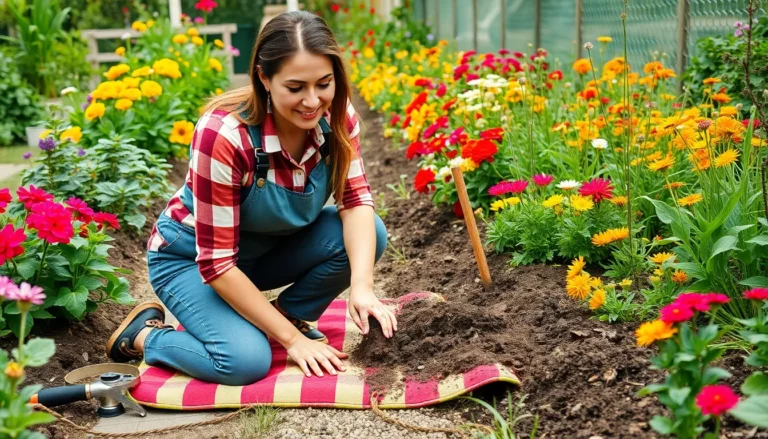Imagine stepping into your backyard and being greeted by a vibrant oasis of fresh veggies and fragrant herbs, all grown without a hint of chemicals. Organic gardening isn’t just a trend; it’s a lifestyle that brings joy, health, and a sprinkle of dirt under your fingernails. Whether you’re a seasoned green thumb or a novice plant parent, embracing organic practices can transform your garden into a thriving paradise.
Organic Gardening Tips
Organic gardening focuses on growing plants without synthetic fertilizers, pesticides, or genetically modified organisms. This approach emphasizes the use of natural processes and sustainable practices, benefiting the environment and personal health.
What Is Organic Gardening?
Organic gardening involves cultivating plants using methods that enhance the ecosystem. It prioritizes soil health through composting, crop rotation, and encouraging biodiversity. This gardening style excludes harmful chemicals, relying instead on natural alternatives like beneficial insects and organic fertilizers. Carrots, tomatoes, and herbs thrive in an organic garden, promoting healthier growth patterns and flavors.
Benefits of Organic Gardening
Organic gardening offers numerous advantages that extend beyond just growing food. It improves soil quality, leading to better drainage and nutrient retention. Additionally, this method supports wildlife habitats, attracting pollinators like bees and butterflies. Health benefits span from reduced exposure to pesticides to the freshness of homegrown produce. Organic gardens often yield more nutritious fruits and vegetables, making them a valuable choice for health-conscious individuals.
Essential Organic Gardening Tips

Organic gardening relies on thoughtful practices that enhance the garden’s health and productivity. Implement the following essential tips for successful organic gardening.
Choosing the Right Location
Selecting an appropriate gardening location influences plant growth significantly. Consider sunlight exposure; most vegetables need six to eight hours daily for optimal development. Drainage matters as well; ensure the area doesn’t retain water to prevent root rot. Analyze the wind’s direction; protecting plants from strong winds fosters healthier growth. Assess nearby trees or structures that may cast shadows, limiting the sunlight available to your garden. Finally, think about accessibility; placing the garden near a water source simplifies maintenance tasks.
Preparing the Soil
Soil preparation plays a crucial role in organic gardening success. Begin by testing the soil’s pH level and nutrient composition to identify needs. Incorporate organic matter such as compost or well-rotted manure to enhance soil fertility. Mixing these additions improves soil texture and water retention. Tilling to a depth of at least six inches aerates the soil and encourages root growth. Create raised beds if the native soil is poor or compacted; this boosts drainage while providing a controlled environment. Finally, practice crop rotation annually to maintain nutrient balance and minimize pests.
Plant Selection and Care
Selecting the right plants and ensuring their health is crucial in organic gardening. Organic seeds and plants contribute to a thriving ecosystem while providing wholesome produce.
Choosing Organic Seeds and Plants
Choosing organic seeds and plants ensures chemical-free growth. Look for varieties suited to the local climate and soil conditions. Sourcing seeds from reputable organic suppliers enhances the likelihood of getting disease-resistant options. Prioritize heirloom varieties, as they often offer better flavors and are better adapted to specific environments. Gardeners can also consider companion planting, which involves pairing compatible plants to naturally enhance growth and deter pests. Utilizing organic transplants from local nurseries promotes healthy establishment in the garden.
Maintaining Plant Health Naturally
Maintaining plant health naturally involves various strategies. Implementing crop rotation reduces soil depletion and pest buildup. Mulching not only conserves moisture but suppresses weeds effectively. Regularly monitoring plants for signs of stress promotes early diagnosis and treatment. Introducing beneficial insects, like ladybugs and lacewings, supports pest control without chemicals. Applying organic fertilizers, such as compost or worm castings, provides essential nutrients. Using organic solutions like neem oil can deter certain pests while being safe for plants and pollinators.
Pest Management in Organic Gardening
Effective pest management is crucial in organic gardening. Utilizing natural methods minimizes reliance on synthetic pesticides while promoting plant health.
Natural Pest Control Methods
Employing natural pest control methods fosters a healthier garden ecosystem. Handpicking pests like caterpillars and slugs can significantly reduce infestations. Introducing barriers, such as row covers, prevents pests from reaching plants. Additionally, homemade solutions, including garlic spray and insecticidal soap, deter unwanted insects. Diatomaceous earth, a natural powder, can protect plants by causing harm to soft-bodied pests. Applying these strategies, gardeners maintain balance without chemicals.
Encouraging Beneficial Insects
Attracting beneficial insects supports natural pest control. Ladybugs and lacewings prey on aphids, reducing their population effectively. Planting flowers like marigolds and daisies creates habitats for these helpful insects. Providing shelter, such as insect hotels or native plants, encourages them to thrive. Creating a diverse garden environment enhances biodiversity, promoting a natural balance. Implementing these practices ensures long-term pest management success.
Sustainability in Organic Gardening
Sustainability plays a crucial role in organic gardening. Adopting practices that replenish rather than deplete resources supports long-term garden health. Soil health remains a top priority, emphasizing composting, mulching, and crop rotation. These practices enrich soil, increase biodiversity, and foster robust ecosystems.
Native plants enhance sustainability by requiring fewer resources. They adapt well to local conditions which reduce the need for additional watering and fertilization. Organic gardeners should focus on biodiversity to create resilient ecosystems. A diverse garden attracts beneficial insects that control pests naturally, minimizing the need for synthetic alternatives.
Rainwater harvesting offers an effective method for irrigation. Collecting rainwater reduces reliance on municipal supplies and lowers water costs. Organic gardeners can implement drip irrigation to maximize efficiency. This method delivers water directly to plant roots, reducing evaporation and runoff.
Utilizing organic materials for pest management contributes to sustainability. Techniques like handpicking pests and introducing beneficial insects limit chemical interventions. Homemade solutions, including neem oil and garlic spray, provide effective alternatives for pest control.
Sustainable gardening goes beyond individual practices. Community involvement strengthens local ecosystems through shared resources and knowledge. Engaging with local gardening groups enhances education on sustainable practices while promoting organic gardening.
Understanding the local ecosystem informs better gardening decisions. Observing seasonal changes and local wildlife helps tailor practices to meet environmental needs. Techniques that align with nature’s rhythms result in healthier soil, plants, and harvests, further enhancing sustainability in organic gardening.
Supporting Local Ecosystems
Organic gardening offers a rewarding way to cultivate a healthier lifestyle while nurturing the environment. By embracing natural practices and prioritizing soil health, gardeners can create vibrant spaces filled with nutritious produce.
The journey into organic gardening is accessible to everyone, whether they’re seasoned green thumbs or just starting out. With the right techniques and a commitment to sustainability, it’s possible to enjoy the benefits of fresh homegrown food while supporting local ecosystems.
As they explore these practices, gardeners will find that the rewards extend beyond the garden, enriching their lives and promoting a deeper connection to nature.




